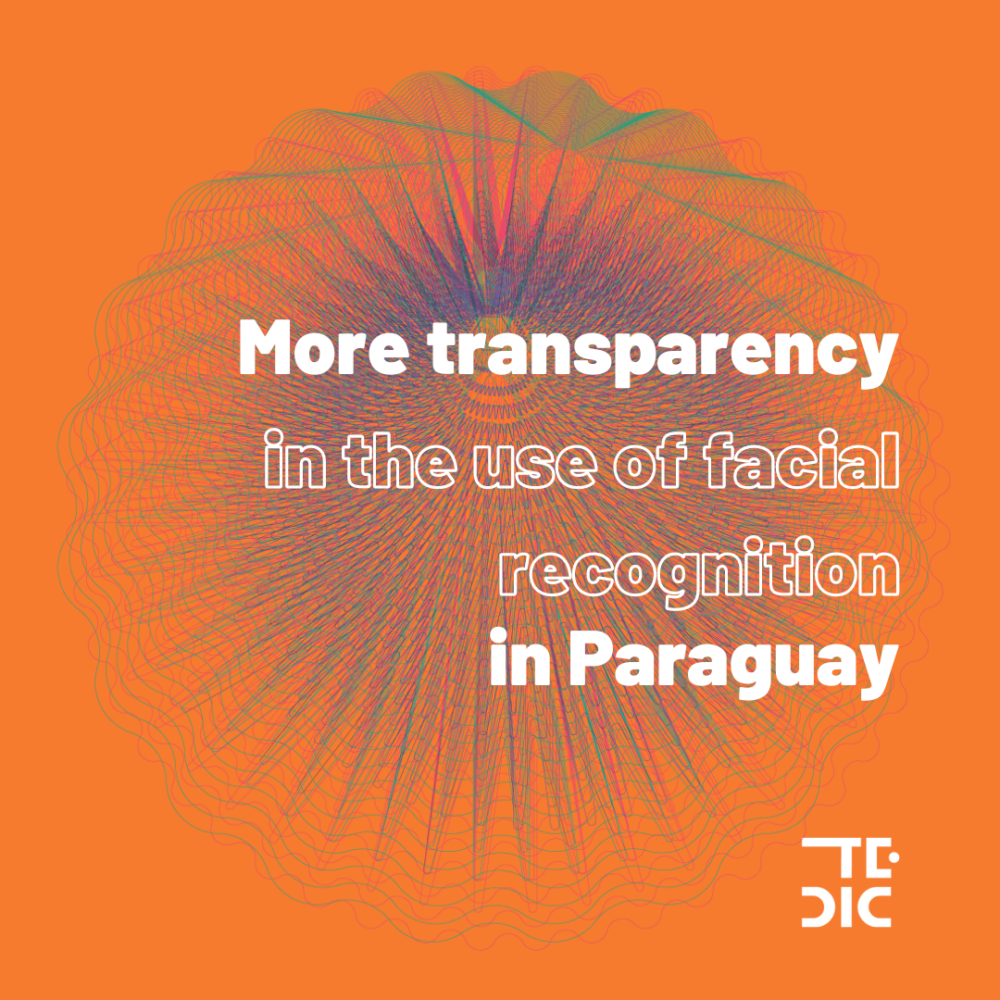
In an increasingly digitalized world, facial recognition technology has become a subject of review, observation, and debate, both internationally and regionally. This technology, which allows identifying or verifying a person’s identity using their biometric data, has been silently integrating into various aspects of our everyday lives.
In Paraguay, we have been warning that the Ministry of the Interior and the National Police, through the Universal Service Funds (FSU) of the National Telecommunications Commission (CONATEL), have been acquiring cameras with this technology and incorporating them into public spaces.
At TEDIC, we believe that the rapid expansion of facial recognition brings with it significant questions about our privacy, the security of our personal data, and transparency in its application. The adoption of this technology in our country follows a similar trend to other Latin American countries, with a swift implementation without impact measurement and, in many cases, lacking sufficient public debate. One of our main concerns lies in the opacity with which these initiatives are being carried out, posing significant risks to our human rights.
In response to this scenario, we launched the project “Transparency and Accountability of the State on Facial Recognition in Paraguay”, supported by the CIRD Foundation. Executed between November 2022 and December 2023, the project aimed to instill critical awareness among legislators and citizens about the need for transparency in accountability in the implementation of facial recognition systems in Paraguay. This project sought not only to raise awareness of the risks of using this technology but also to promote an informed and constructive debate on its implications.
In addressing these issues, we aim to ensure that the use of facial recognition in Paraguay not only complies with ethical and legal standards but also respects human rights. Our goal is to ensure that any implementation of facial recognition technology in Paraguay is done exceptionally, limitedly, and proportionally, always under the principles of transparency and accountability.
Below, we share a series of activities carried out within the framework of this project:
National and international events
Our project not only had an impact at the national level but also reached various communities in the region through participation in international events and workshops that promote the protection of our digital rights.
Biometrics and personal data workshop for journalists
In Asunción, on March 30, 2023, we trained and educated journalists, influencers, and communicators on biometrics, personal data, politics, human rights, privacy, and technology. We shared conceptual tools and fostered discussion on these topics at the local, regional, and international levels, with a special focus on data protection in Paraguay and the state’s recent actions in this area.
Additionally, we presented the dimensions related to the tenders for the acquisition of cameras with facial recognition technology by the Paraguayan State, detailing the scope of the ongoing unconstitutionality action that we have been promoting since 2018.
Biometrics workshops in various universities across the country
With the intention of decentralizing the discussion on these topics, we took the workshop to other cities in Paraguay. The first stop was on June 8 in Villarrica, where we conducted another workshop framed in the project #MoreCitizenshipLessCorruption. In this workshop, we presented the facial recognition camera simulator developed voluntarily as part of the project, which allowed participants to better understand the functioning of this technology and its potential threats.
This event was organized in conjunction with the Rectorate of the National University of Villarrica del Espíritu Santo (UNVES) and had significant local impact, even reaching the media.
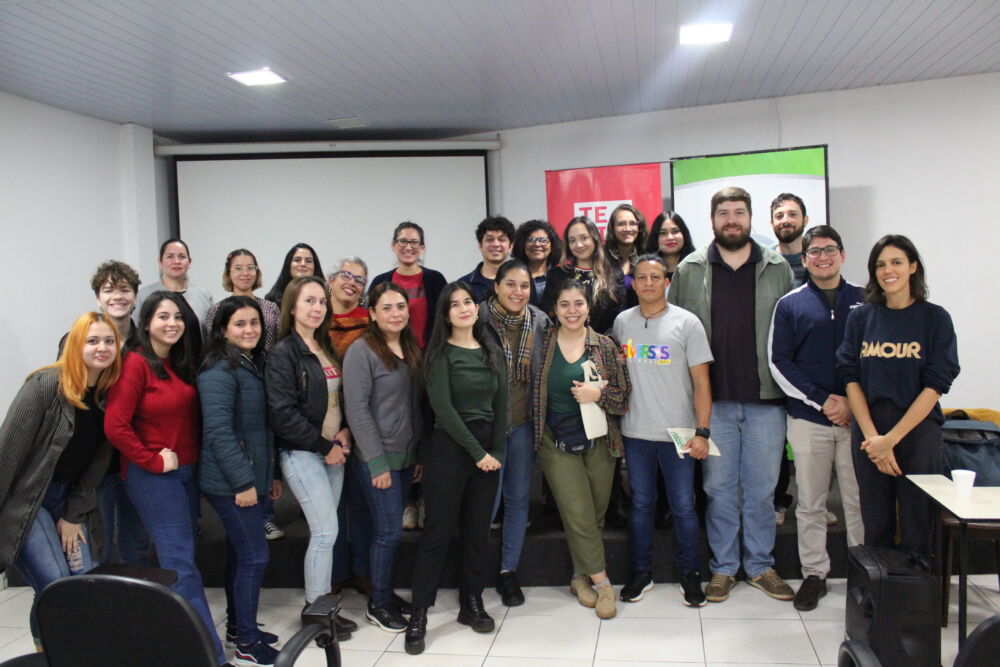
Similarly, we replicated the workshop on June 28 in Encarnación, where we gathered students from the National University of Itapúa, members of the Faculty of Science and Technology; Faculty of Humanities, Social Sciences, and Guarani Culture; the Student Center of the Faculty of Science and Technology, and the Social Work Career Directorate, with the support of the organizations Presencia Joven, Feminist University Students of Itapúa, Kuña Sorora, Diversxs, Cinecable, and Kuña Roga.
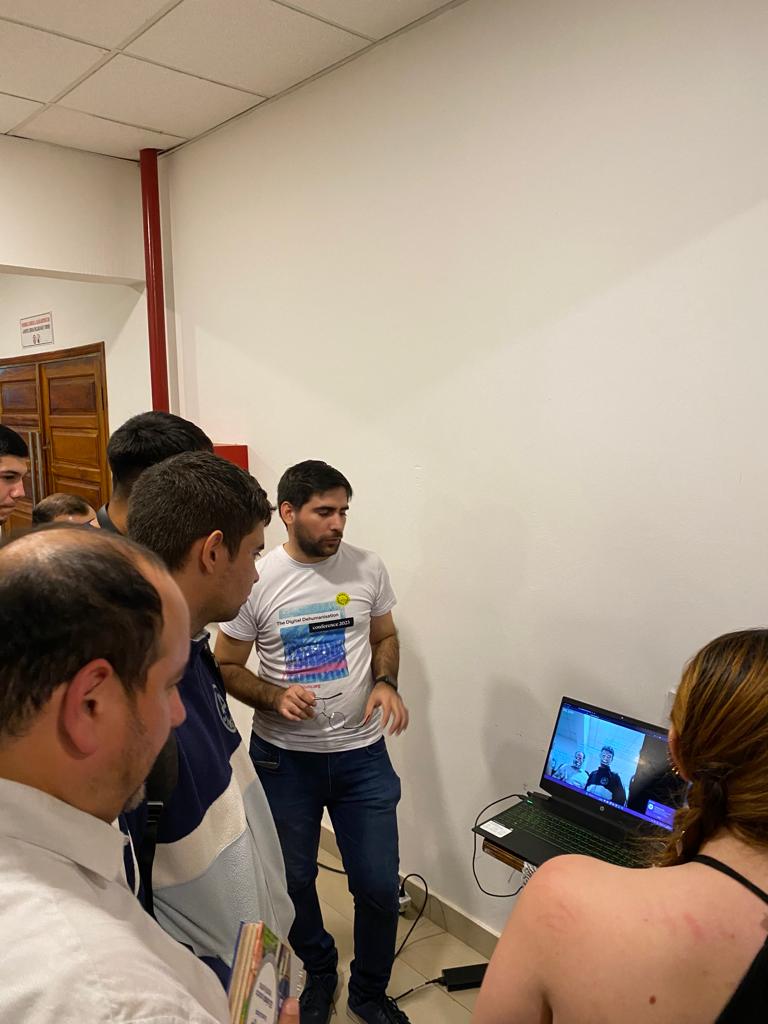
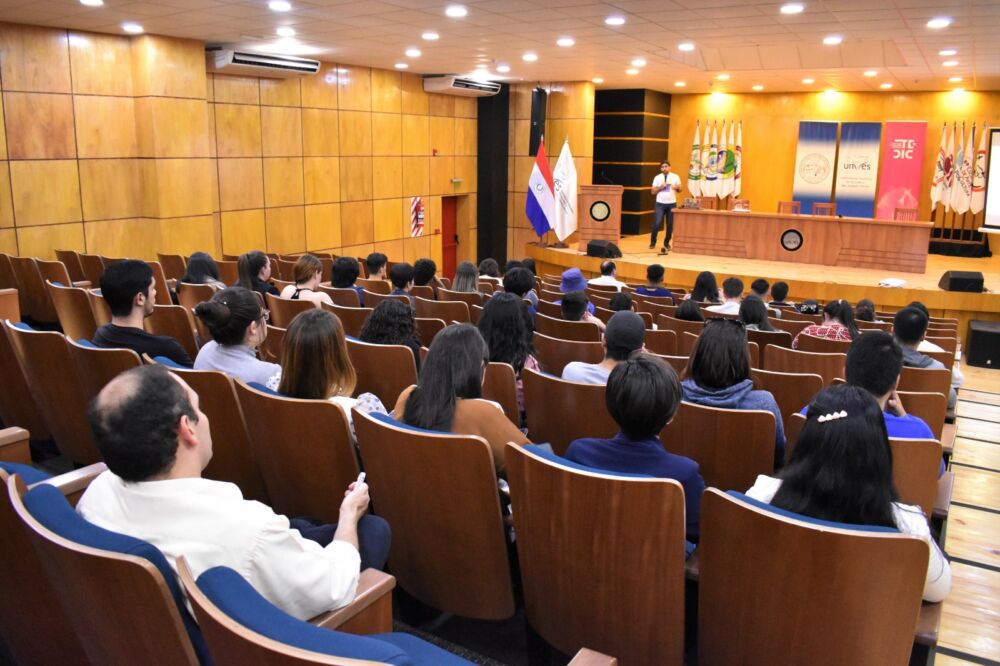
International seminar: Borders, Technology, and Security in Ciudad del Este
From a local and regional perspective, on July 18 and 19, we organized the International Seminar “Borders, Technology, and Security,” developed with the support of the Rectorate and the Postgraduate School of the National University of the East (UNE), INECIP, and the CIRD Foundation.
The event was attended by representatives from organizations in Alto Paraná, including Piensa, MILABHUB, IEEE Student Branch UCAP, and ReAcción. These organizations participated in the development of the seminar over two days in which we debated the context and political and social situation regarding security, technology, and surveillance in the tri-border area between Argentina, Paraguay, and Brazil.
Additionally, in these training and debate sessions, authorities and experts in these fields participated, focusing discussions on various security programs implemented in the Triple Border area and the implications of digital technology on the security and human rights of individuals. We also explored the intersection between the digital sovereignty of states and the role of the private sector in these initiatives.
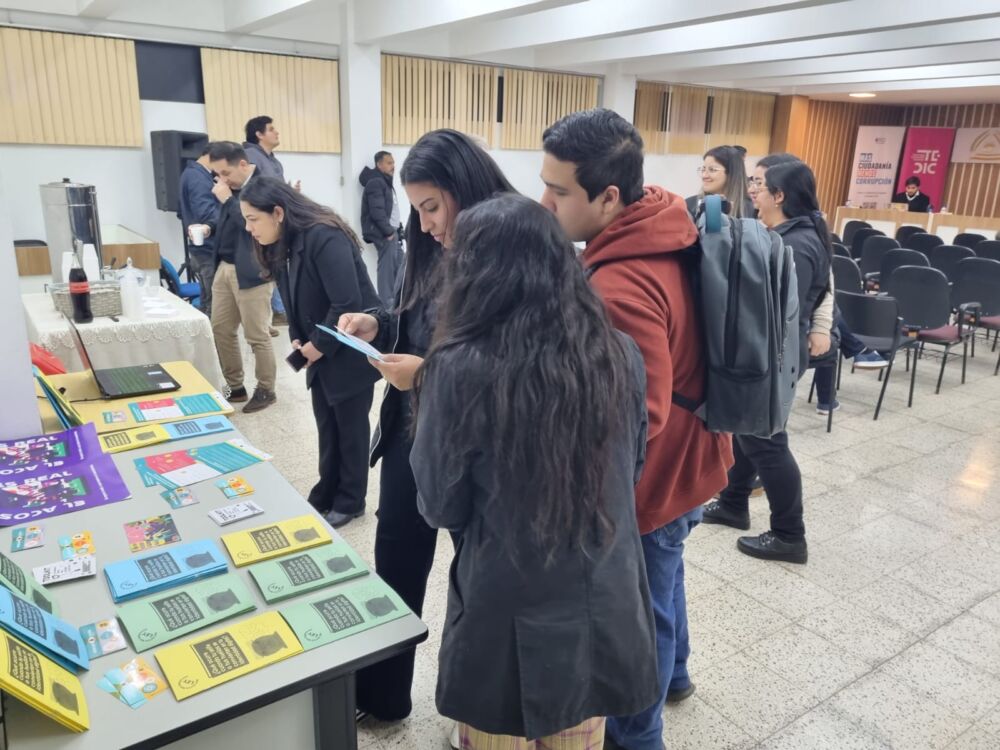
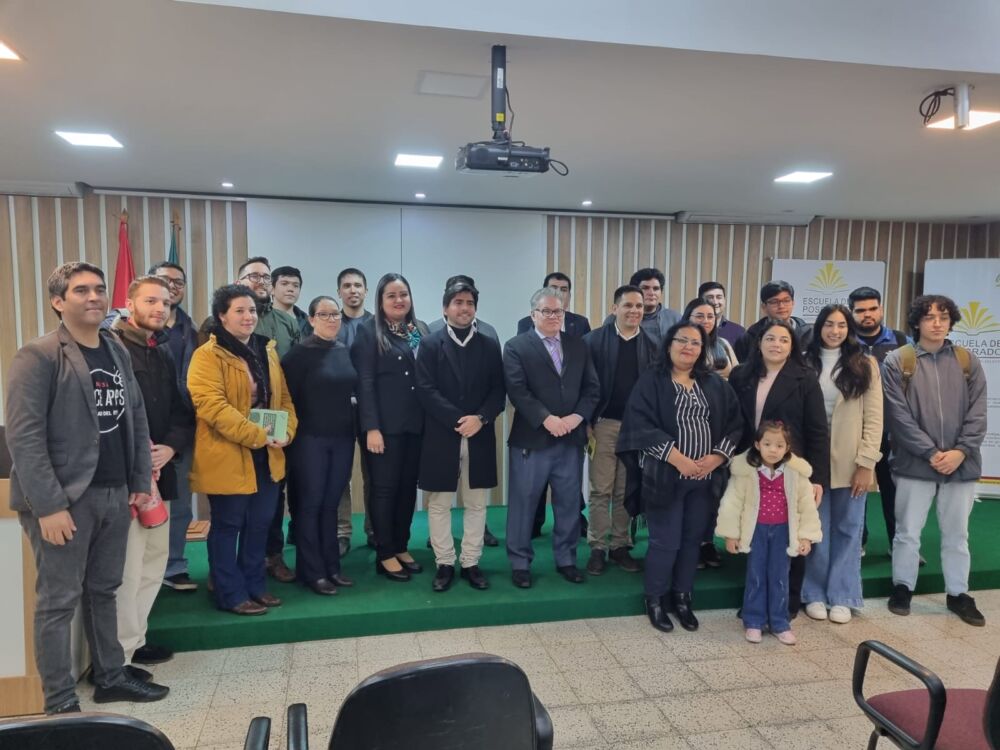
Hackcorruption 2023 Colombia
After a competitive application, our project was selected to participate in Hackcorruption 2023, held for Latin America in Bogotá, Colombia, from August 18 to 22. The objective of this event was to address corruption problems through innovative technological solutions. In collaboration with Idec (Brazilian Institute for Consumer Protection) of Brazil, from TEDIC, we presented a prototype platform called “Monitor Vigilante.”
The “Monitor Vigilante” prototype was conceived as a citizen control observatory aimed at monitoring the acquisition and use of invasive technologies in Latin America. In its initial phase, we proposed the use of open data from the Paraguayan State, specifically from the National Directorate of Public Procurement (DNCP), with plans to include data from other entities such as the Directorate of War Material (DIMABEL), the National Police of Paraguay, and the Ministry of the Interior.
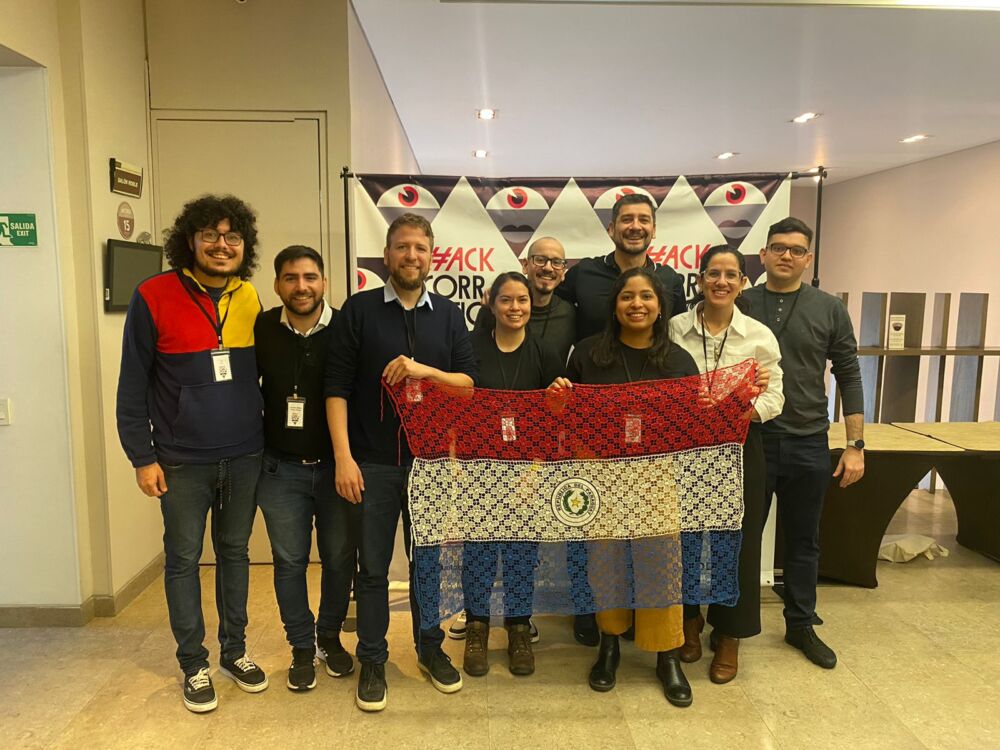
National Advocacy
We held meetings with authorities and presented litigation to promote transparency in the use of this invasive technology. Authorities from the Executive, Legislative, and Judicial branches were alerted to the existing risks and consulted about their involvement in the matter.
We invite you to explore in detail our activities below to understand the full impact of our project, carried out with the support of the CIRD Foundation.
Meeting with the Ministry of the Interior
On May 2, a meeting was held with the Deputy Minister of the Interior, the General Director of the 911 System, and legal representatives of the Ministry of the Interior, along with the TEDIC team. The main focus of the discussion was our concern about the use of facial recognition cameras and the lack of institutional response to these concerns, especially regarding our request for access to public information that was denied for reasons of “national security” and is currently in litigation before the Supreme Court of Justice.
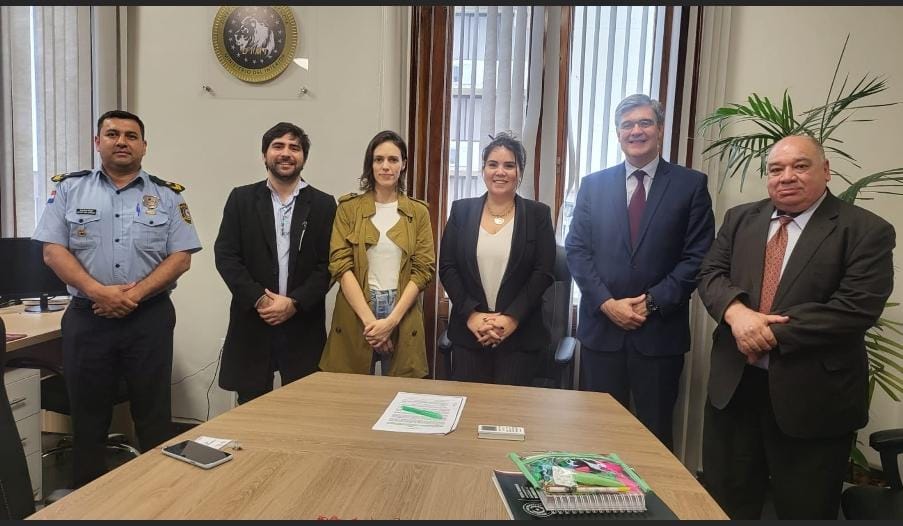
National Advocacy
We held meetings with authorities and presented litigation to promote transparency in the use of this invasive technology. Authorities from the Executive, Legislative, and Judicial branches were alerted to the existing risks and consulted about their involvement in the matter.
We invite you to explore in detail our activities below to understand the full impact of our project, carried out with the support of the CIRD Foundation.
Meeting with the Ministry of the Interior
On May 2, a meeting was held with the Deputy Minister of the Interior, the General Director of the 911 System, and legal representatives of the Ministry of the Interior, along with the TEDIC team. The main focus of the discussion was our concern about the use of facial recognition cameras and the lack of institutional response to these concerns, especially regarding our request for access to public information that was denied for reasons of “national security” and is currently in litigation before the Supreme Court of Justice.
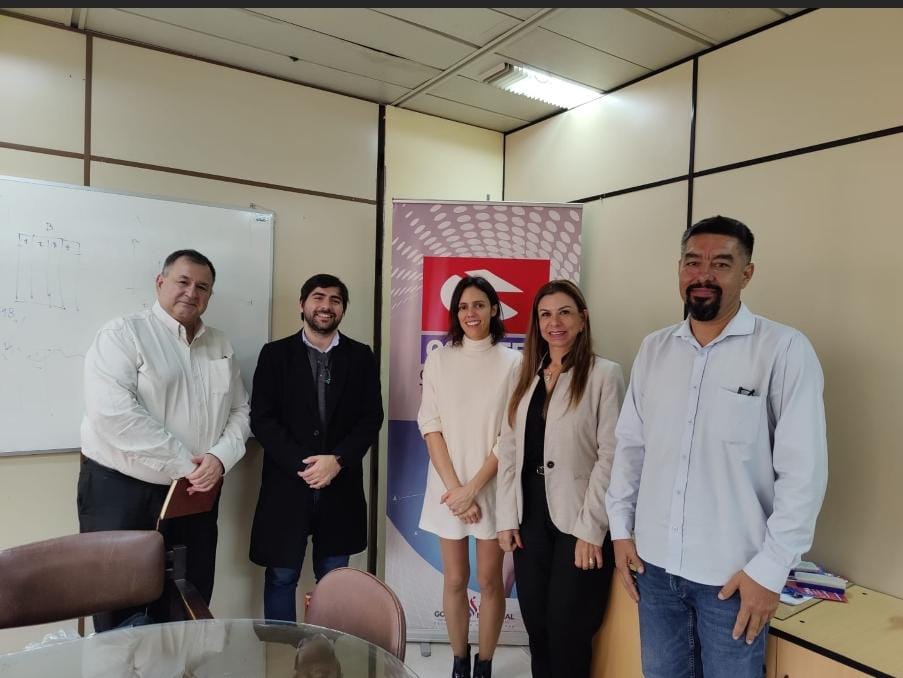
Meeting with Executive branch authorities
On May 4, TEDIC arranged a meeting with Engineer Nicolás Evers, the planning and development manager of the National Telecommunications Commission (CONATEL) in Paraguay.
Among the topics we addressed was the clarification that the institution endorses the purchase of facial recognition cameras for the National Police based on the law that creates the 911 System, thereby considering the 911 System as a “telecommunications provider.” In the same vein, we discussed the distribution of Universal Service Funds (FSU) and their discretionary management by the Executive Power, with insufficient control mechanisms from the civil population.
In the meeting, we recalled the strategic litigation initiated by TEDIC since 2018 and warned of possible new measures in case the access to information continues to be obstructed and the questionable use of resources, considered by our organization, are outside their essential purpose.
Meeting with the Judiciary and the Public Prosecutor’s Office
On April 25, we held a key meeting with Minister Ramírez Candia and Nury Montiel, Director of Human Rights of the Supreme Court of Justice, where issues such as biometrics, concerns in judicial processes that must guarantee our digital rights, and the need for a data protection law were discussed.
In August, TEDIC held hearings with the Minister of the CSJ, Dr. Gustavo Santander, and the Attorney General, Dr. Emiliano Rolón, to discuss these matters. These were accompanied by the coordinator of the #MoreCitizenshipLessCorruption project, Francisco Alcaraz from CIRD.
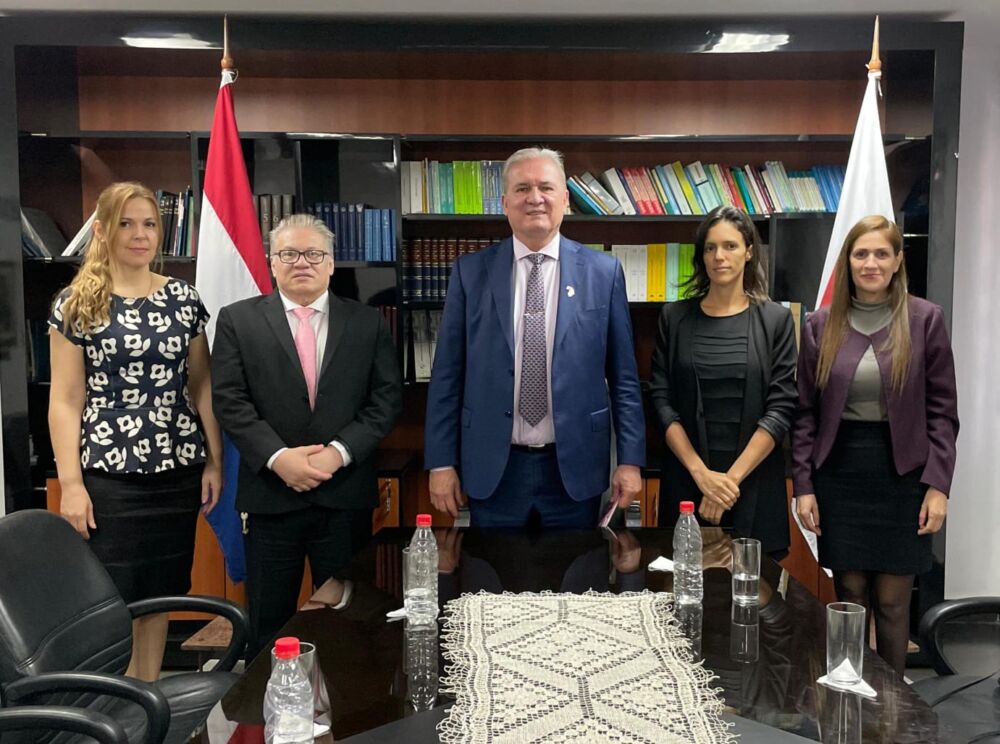
The conversations focused on the transparency of the use of facial recognition technologies and the security of personal data. From TEDIC, we offered the authorities of both institutions to maintain an open communication channel to inform about the actions taken in matters of justice and digital rights.
New urgencies in facial recognition litigation
At TEDIC, we maintain the conviction of the importance of establishing solid precedents in the protection of human rights in the context of the use of technology and mass surveillance, especially in the Judiciary.
This year we presented two new urgencies seeking to expedite the resolution of an unconstitutionality action filed in 2019, where we demand information on the implementation of biometric technology in video surveillance cameras in Asunción, following denials by the Ministry of the Interior to information requests. The request covers details about the biometric system implemented since July 2018, including data processing protocols, the purpose of the system, error rates of the algorithm, and its impact on human rights.
The case is pending resolution by ministers Gustavo Santander, Victor Rios, and Cesar Diesel, with the latter being the pre-opinion judge. The resignation of the former minister of the CSJ, Antonio Fretes, who was the pre-opinion judge, led to further procedural delays in the case.
To accompany the presentations and raise awareness about the importance of the case, a communication action was carried out, including an explanatory video and a blog post.
New legal actions on facial recognition
In line with our principles, the execution of strategic litigation is an integral part of our work. At TEDIC, during the year 2023, we have again submitted new requests for public information access regarding facial recognition cameras in Paraguay, in line with our legal action promoted in 2019.
Based on the research we are about to publish on the recent state acquisitions of facial recognition cameras, we have identified a new opportunity for strategic legal actions in this area.
These new legal actions filed by TEDIC against the National Police and the Ministry of the Interior of Paraguay, registered as Case Files 2320/2023 and 2319/2023, illustrate a significant effort in promoting transparency and access to public information. These cases, dated December 5, 2023, confront the refusal of these institutions to provide data on the implementation and use of facial recognition technologies.
The first case (File 2320/2023) against the National Police, processed in the First Instance Civil and Commercial Court of the 19th turn (Secretary 37), focuses on obtaining statistics that had already been partially published, highlighting a discretionary use of the “national security” argument to deny information. The complete request can be consulted here.
The second case (File 2319/2023) against the Ministry of the Interior, processed in the First Instance Civil and Commercial Court of the 3rd turn (Secretary 5), seeks details on the implementation of video surveillance cameras, including cameras with facial recognition technology. This case follows the line of the previous one, and its detailed request is available here.
These legal actions, in addition to seeking specific information, aim to promote a broader discussion about the need for transparency and accountability in the use of invasive surveillance technologies by the State.
Not With My Face: art and innovation to discuss facial recognition
This project had a significant national impact by addressing the risks and challenges of facial recognition, combining communication, justice, art, and technology. From a cross-sectional perspective, we created a graffiti in downtown Asunción and distributed over 1000 fanzines at events held in various cities of Paraguay. More than 300 people, including 30 journalists, participated in in-person activities, and over 5000 people were sensitized through our communication campaign on social networks.
In addition, we developed interactive tools that were not initially planned in the project but turned out to be essential during the campaign and workshops. These tools helped present the functioning of facial recognition technologies in an accessible way to those who participated in our workshops and events on the subject. Below are some of the main activities and products of this project:
Raising awareness through art and communication
At TEDIC, we created a fanzine in both digital and print formats, as a means to strengthen the communication campaign of the project and to explain the functioning of biometric data capture systems, including facial recognition.
1000 copies of the fanzines were distributed at in-person events in Asunción, Ciudad del Este, Encarnación, and Villarrica.
Additionally, to amplify its digital dissemination, we developed a vertical format video, adapted for social networks like TikTok and Reels on Instagram, Facebook, and YouTube. In this video, we mention some of the risks arising from datafication in light of privacy abuses and existing biases in developed technologies, and we invite viewers to download the material for a more detailed understanding.
Moreover, between November and December 2022, we created a graffiti in public spaces, specifically on the streets of 14 de Agosto and Palma in downtown Asunción, to launch the #ConMiCaraNO and #MisDatosMisDerechos campaigns.
The design was created by the renowned graffiti artist and human rights activist, Oz Montania. Alongside the artist, we explored through art the risks of facial recognition cameras in public spaces and the need to make their use transparent.
This process was documented through a video shared on our networks, serving as an initial position for raising awareness.
Interactive Tools
Face tagging simulator
As a complementary addition to what was initially planned in the project, TEDIC has developed a website with open-source facial recognition technology that can detect facial features, identifying gender, type of expression (joy, sadness, anger, neutral), and the age of the person using it.
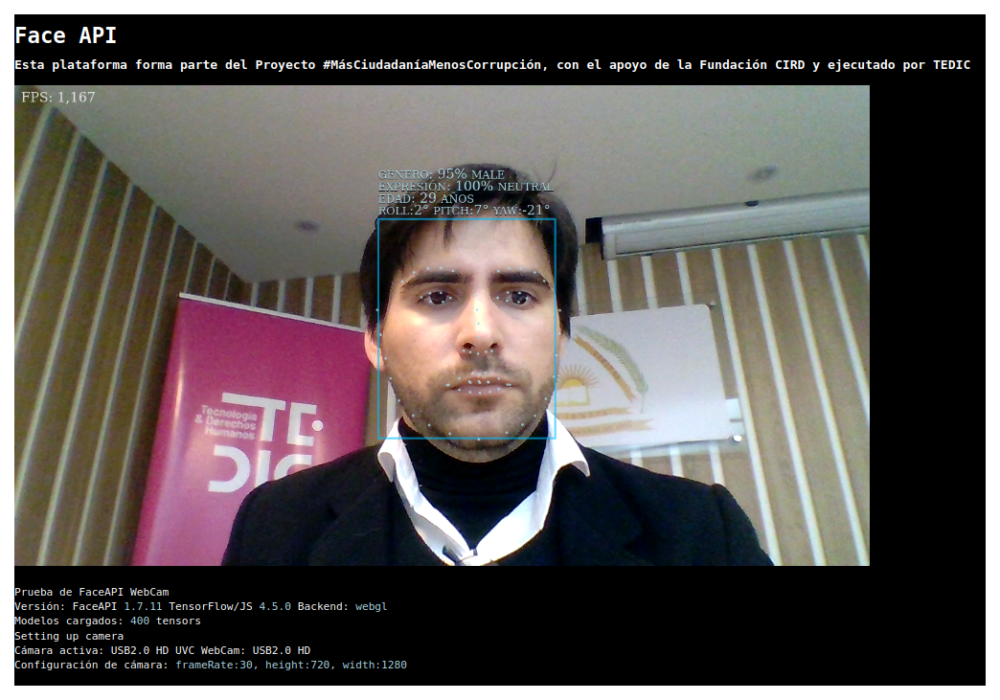
The website is easily accessible from any browser, whether on mobile devices or computers, and is available at: https://cara.tedic.org/demo/webcam.html
The tool was publicly presented in the workshops in Villarrica, Ciudad del Este, as well as regionally at the Hackcorruption 2023 event in Bogotá, Colombia.
Monitoring the watcher – Tool to map public surveillance cameras
In pursuit of promoting a culture of transparency and integrity, using free computing tools and collaborating with awareness of the dangers of mass surveillance in public spaces, TEDIC developed this initiative as part of the activities carried out during the project with CIRD.
The setup of the platform involved engaging with the global community of MapComplete, a web software based on Open Street Maps (OSM) that allows collaborative mapping of cameras through its “Surveillance Under Surveillance” module.
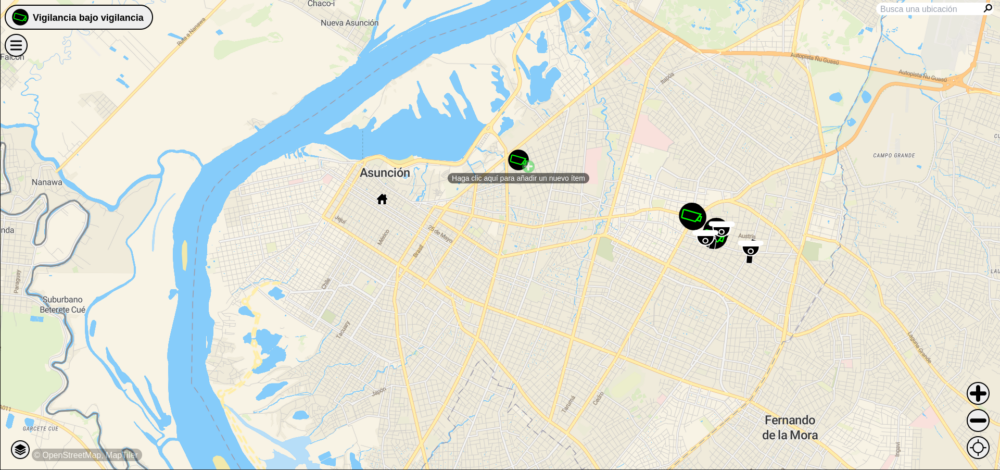
The task of translating the site, originally in English, was carried out by our team at TEDIC to ensure its use in the national territory and other Spanish-speaking countries.
This tool was presented in the workshops in Villarrica and Ciudad del Este.
Documentation on the National Police data leak, including 4 Million images of faces
Furthermore, we took the initiative to write and publish an article on October 4, 2023, titled “The Police Data Leak in Paraguay and an Urgent Need for Answers.” The core of the article addresses the recent and alarming leak of over 400GB of confidential data belonging to the National Police of Paraguay. This leak not only exposes personal details and records related to police investigations but also reveals a significant vulnerability in biometric data, including faces captured by facial recognition cameras and the Civil Identifiers (CI) from identity cards.
This work highlights the persistent concerns we at TEDIC have been pointing out regarding implemented cyber surveillance technologies, information custody chains, and the lack of transparency protocols by the National Police. We believe that the exposure of this critical information endangers our security and privacy, evidencing a lack of proper and responsible management in terms of personal data protection in our country.
This article is directly linked to the concerns we have been expressing since 2018 about the implementation of facial recognition cameras in Paraguay. The leak confirms our previous warnings, showing that what happened could continue to occur if appropriate measures are not taken.
At TEDIC, we will continue to fight in the advocacy for the approval of a comprehensive Personal Data Protection Law in Paraguay, urging authorities to provide information about the purchase of facial recognition cameras and creating spaces for discussion and training around the need for impact studies and a human rights perspective on the path to digitalizing a large number of processes in Paraguay.

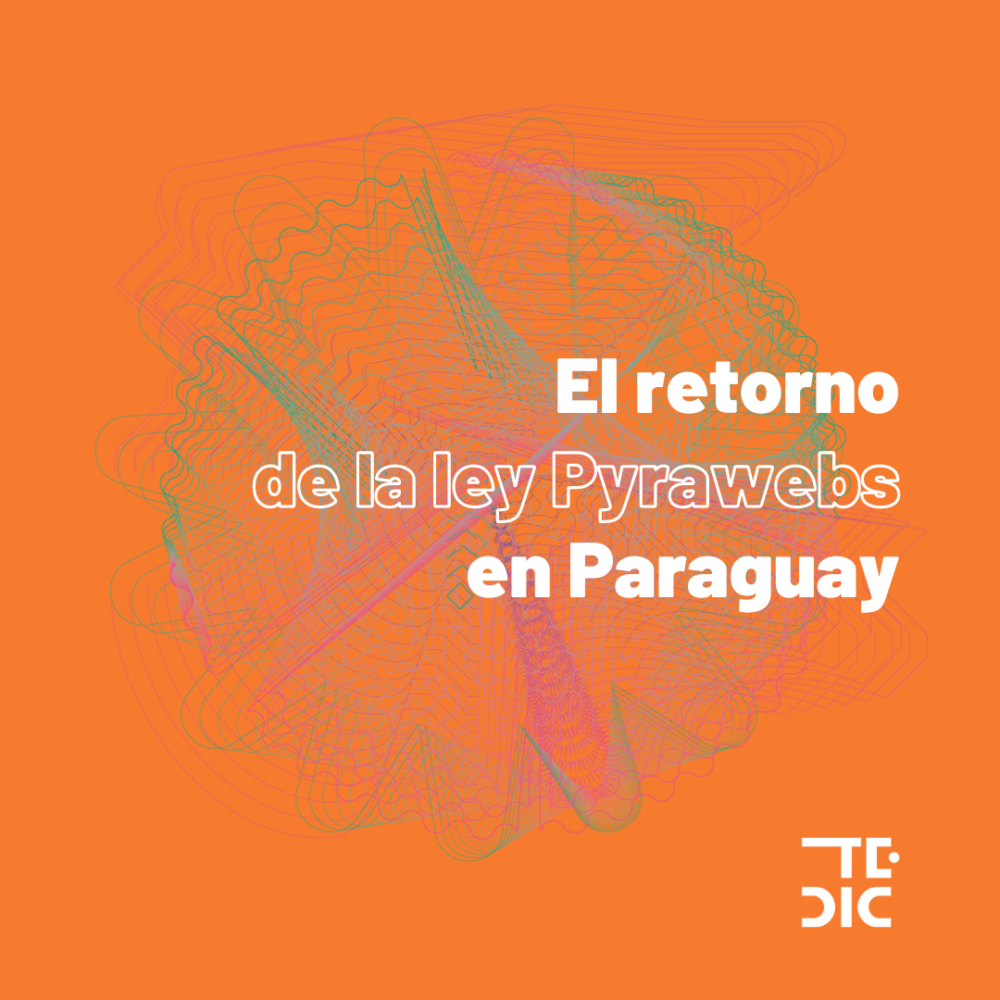 The return of the Pyrawebs law
The return of the Pyrawebs law  Worrisome regulation on disinformation in times of COVID19
Worrisome regulation on disinformation in times of COVID19